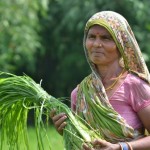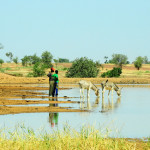By Eva Wollenberg, Monika Zurek and Alex De Pinto Coping with climate change in agriculture while ensuring food security and reducing greenhouse gas emissions or emission intensities will require new information, technologies, finance instruments and possibly new institutions. Many countries are building these capabilities now, but there is much uncertainty about what is needed and what is feasible. Click here to […]
Low Emission Development Strategies for Agriculture and Other Land Uses: The Case of Colombia.
By Alex De Pinto, Senior Research Fellow It is widely recognized that natural resource use in many developing countries, from crop production to deforestation, is responsible for the bulk of greenhouse gas emissions. We also know that, in many countries, the agricultural and forestry sectors can provide low-cost climate change mitigation opportunities. As countries experience […]
Environmental Migration and Labor Markets in Nepal : Where Climate Change and Labor Meet
Recently published by IFPRI researcher Valerie Mueller , Environmental Migration and Labor Markets in Nepal, takes a closer look at the impact of internal migration due to various shocks—particularly those that are weather-related—on Nepal’s labor markets. For key findings, read more here...
New climate change report shows innovative tool to measure value of climate services for farmers
By Arame Tall
Climate information can be a powerful tool in helping rural communities adapt to climate risk. But not all information is created equal, nor is access to information equal. To better understand the value of climate information in these communities, researchers started out by asking: does climate information matter to women farmers? The International Food Policy Research Institute (IFPRI) in conjunction with the CGIAR Research Program on Climate Change, Agriculture and Food Security (CCAFS), and CGIAR Centers, has been engaging in projects to deliver climate services to smallholder farmers across Africa and South Asia.
Project: Investigating the impact of climate extremes on future water and food security
What is the challenge? Extreme hydroclimatic events such as droughts and floods cause huge damages in South Asia and East Africa, in particular to agricultural production and rural livelihoods. Long-term climate projections suggest that more frequent and severe hydroclimatic extremes are likely to happen in the decades to come. Enhancing farmers’ coping capacity and improving […]
- « Previous Page
- 1
- …
- 3
- 4
- 5
- 6
- 7
- Next Page »



